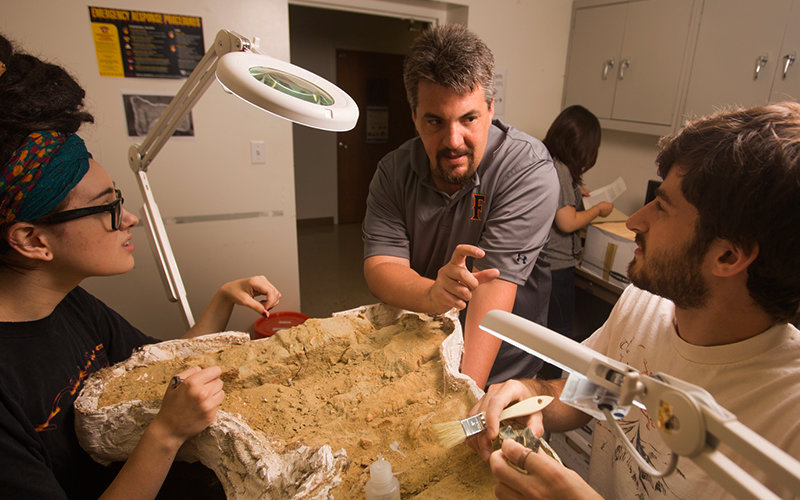
Cal State Fullerton has been awarded a five-year $5.8 million grant from the U.S. Department of Education for a project partnering with eight regional community colleges to increase the number of Hispanic and low-income transfer students who complete bachelor’s degrees in STEM (science, technology, engineering and mathematics) and enter careers in these fields.
CSUF is partnering with Citrus, Cypress, Fullerton, Golden West, Mt. San Antonio, Orange Coast, Santa Ana and Santiago Canyon community colleges for the “Regional Alliance in STEM Education: Raising the Bar in Transfer, Retention and Graduation Rates,” called Project RAISE. CSUF is receiving about $1.2 million in first-year funding.
“The objective of Project RAISE is very clearly to help low-income students and specifically Hispanic students, since they are underrepresented in STEM fields, to be successful in completing their STEM bachelor’s degree and either go on to graduate or professional school or into the workforce in Orange County,” said Mark S. Filowitz, associate dean of the College of Natural Sciences and Mathematics and interim associate vice president for academic operations.
Filowitz is directing the effort with Susamma Barua, interim dean of the College of Engineering and Computer Science, and Maria V. Dela Cruz, the University’s (STEM)² program (http://news.fullerton.edu/2013su/STEM2%20program.asp) project director.
“In the process, the project will create a regional consortium made up of CSUF and the participating community colleges, as well as empower students to streamline the transfer process to a four-year university,” Filowitz added.
Highlights of the project include peer-mentor support for students at the partner community colleges, and participants also can join in summer research experiences with CSUF faculty mentors. “Both are acknowledged high-impact practices contributing to student persistence to degree attainment,” Filowitz said. Additionally, those involved in summer research will receive a $5,000 stipend.
The project will support community college STEM majors in transferring to any four-year university. Additional offerings will further support those transferring to CSUF, including: priority registration to participants; a “RAISE Transfer Program” to ease their transition to CSUF, which includes a bilingual family orientation day; and paid summer internships arranged by partnering campus career specialists with the Orange County Business Council and supported by local companies to prepare students for the STEM workplace.
Other support to community college students will include training on a free web-based resource called “Transferology” to help them identify transferable courses to a four-year STEM degree program.
CSUF also will host an annual STEM conference for partner community college counselors to discuss STEM transfer and enrollment requirements and receive other information to assist students with a seamless transfer to a four-year university.
Project RAISE builds and expands on the successes of two other CSUF federally funded grant projects aimed at attracting and graduating more students in STEM: TEST:UP, a $1.5 million National Science Foundation three-year grant effort funded in 2008, which partnered with Mt. San Antonio and Santa Ana colleges; and (STEM)² — Strengthening Transfer Education & Matriculation in STEM — which partnered with Citrus, Cypress and Santiago Canyon colleges. In 2011, CSUF received a nearly $6 million HSI-STEM grant for the five-year (STEM)² program.
“Project RAISE will incorporate new and innovative opportunities, as well as leverage proven interventions to advance a replicable model for STEM transfer student education,” Filowitz said.
The federal funding was awarded under the U.S. Department of Education’s Hispanic-Serving Institutions (HSI) STEM Program, which aims to develop activities to improve and expand an institution’s capacity to serve Hispanic and low-income students. CSUF and the community college partners are all HSI institutions.
Cal State Fullerton was named a Hispanic-Serving Institution in 2004. The designation is given by the U.S. Department of Education to nonprofit institutions with at least a 25 percent Latino student population, and half of those students are at or below the poverty level. More than 40 percent of CSUF’s student population is Hispanic.